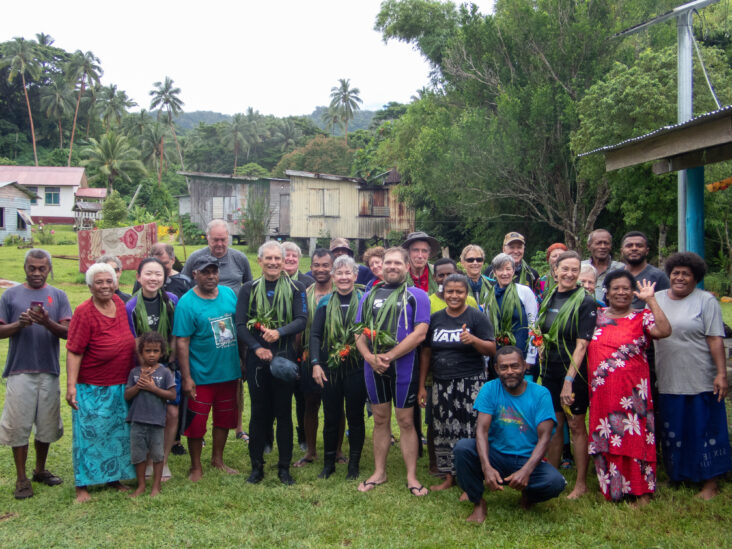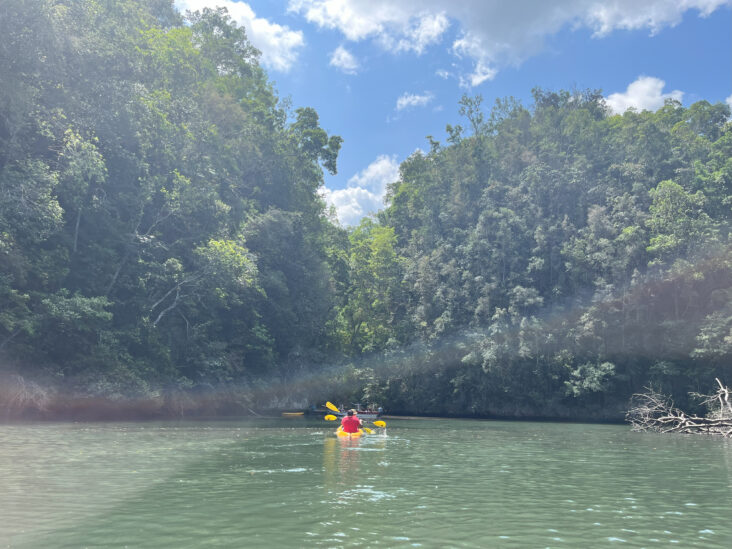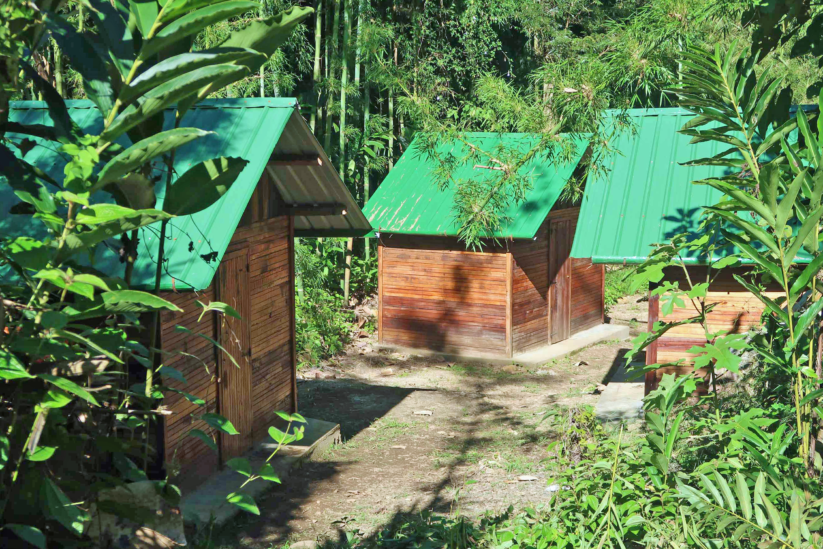Ecotourism and why it matters
You’ve probably heard the term “ecotourism” thrown around by travelers and travel providers. But what exactly does it mean, and what are its implications for the environment?
What is ecotourism?
Ecotourism is generally understood as tourism that is designed to minimize environmental impact and foster protection and appreciation of the environment. Part of the larger field of responsible tourism, ecotourism often connects travelers with local ecosystems and wildlife through activities like backpacking, birding, or scuba diving. The revenue it generates helps local families and helps pay for conservation of the local environment and facilities for visitors.
Seacology’s own popular travel program brings guests to some of the world’s most fascinating island destinations to meet our partner communities and see the impact of our work up-close. We always try to partner with providers that prioritize reducing their environmental impact and benefit local people.

Dozens of Seacology projects have also helped island communities develop their own ecotourism initiatives. We fund infrastructure, training, and capacity-building needed for local people to sustainably benefit from their local ecosystems (more on this below).
Ecotourism vs. conventional tourism
Conventional approaches to tourism can cause severe damage to the environment, particularly the fragile environments of islands. For example, hotel builders often rip out mangroves and other coastal wetlands. The runoff from large resorts and golf courses often finds its way into coastal waters, damaging coral reefs. Anchors dropped from yachts and recreational fishing boats can drag across the seafloor, digging up seagrass meadows. And with large-scale tourism, local people are often relegated to low-paying jobs and have little control over development.
Helping communities prosper long-term
Island communities, especially in the global south, face enormous economic pressure to unsustainably exploit natural resources. Timber and palm oil companies, for example, routinely make tempting offers to buy the rights to islanders’ land or water. While selling off a plot of forest or coastline may bring in significant income, this is usually a one-time deal.
Ecotourism, on the other hand, provides a financial incentive for conservation instead of exploitation. A well-protected forest is more attractive to hikers than one that’s been extensively logged. Scuba divers are more interested in reefs with vibrant coral and lots of fish. In short, healthy ecosystems are more valuable for ecotourism than degraded ones, so there’s a built-in incentive to keep them healthy.
In addition to preserving valuable habitats, locally controlled ecotourism can provide benefits to the community indefinitely, creating jobs, deepening the connections between local people and their ancestral territory, and fostering dialogue and cultural exchange between locals and visitors.
Seacology projects: Ecotourism in action
Around the world, we support island communities’ sustainable-tourism projects. These are efforts that are locally controlled, small-scale, and centered around wildlife and culture. Here are some of our favorite recent examples.
Paddling for the planet in the DR

Ecotourism is a central component of our nationwide initiative to protect mangroves in the Dominican Republic. We’ve funded mangrove-based camping tours for local kids and teenagers, helped communities move away from overreliance on fishing by developing their kayaking businesses, and built boardwalks where locals and visitors alike can observe the many birds, iguanas, and other animals that inhabit the DR’s mangroves.
Climbing for conservation in the Philippines
The watershed forest surrounding Lobo Municipality drains into the Verde Island Passage, arguably the most biodiverse marine ecosystem in the world. Here, Seacology worked with local people to improve trails and climbing equipment leading to the Nalayag peaks, a collection of spires that offer stunning panoramic views of the mountains and sea. After Seacology funded the project, dozens of people have signed up to work as guides and are replanting native trees along the trail.

Lodging for lemurs in Madagascar
Madagascar is world-renowned for its incredible biodiversity. Countless unique plants and animals, including more than 100 species of lemurs, have evolved on this island and are found nowhere else in the world. These creatures are unfortunately at risk from deforestation driven by the country’s widespread poverty. Seacology is working with three villages to protect more than 3,500 acres of Marojejy National Park, one of the most important forest habitats in the country. Our project refurbished guest cabins, helping the communities welcome more visitors and generate much-needed revenue. The money helps fund more patrols of the area, discouraging logging and poaching.

Check out all Seacology ecotourism projects
We have dozens of other ecotourism-focused projects spanning the globe. Check them all out here.
Managing drawbacks
Many of our ecotourism projects are designed by locals for locals–for example, in the mountains of Borneo, Tiga Bundu village has repurposed its rattan-gathering trails for trekkers who come mostly from the island.
But encouraging travel to an environmentally sensitive area involves weighing the many benefits against the potential impact of large numbers of visitors. International travel usually involves long-distance flights, which produce significant carbon emissions.
We are often asked if this trade-off is worth it. We think the benefits that ecotourism provides—provided that it’s implemented appropriately—outweigh the costs. Seeing a pristine island ecosystem firsthand and learning from local people what its preservation means to them can be a profound experience that motivates a greater commitment to environmental protection. The financial support from visitors is often crucial for local communities.
It’s also important to recognize that not all claims of sustainability from travel providers should be taken at face value. Resorts and other tourism operators will often advertise environmental policies that are in practice superficial and don’t significantly benefit local ecosystems or people (commonly referred to as “greenwashing”). On this point, we’ll close with a word from Seacology’s Executive Director Duane Silverstein, who has led dozens of trips to islands from Papua New Guinea to Tierra del Fuego:
“Many hotels make a big deal of the fact that they don’t clean your sheets or towels every day for ecotourism purposes. This is not true ecotourism that provides sustainable benefits for the local community while helping to protect nature,” Silverstein argues. “When ecotourism is well done it is a big plus but beware of places that call themselves ecotourist lodges that do not do much for the local community.”

